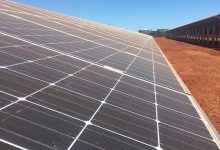Leading “fossil free” superannuation fund Future Super says Australia could fund the investment needed to reach 100 per cent renewable energy by 2030 with less than eight per cent of the savings in the country’s superannuation pool.
In its latest Impact Report, Future Super also says the benefits of putting investments in a fossil free superannuation fund could be one of the most effective things that can be done to prevent climate change.
Through an analysis of its portfolio holdings, Future Super found that two of its investment options contributed to a net reduction in greenhouse gas emissions. The benefits of shifting your retirement savings into options that avoid fossil fuel investments could have substantially more impact in terms of avoiding climate change than many common lifestyle changes.
Future Super has been able to offer members the opportunity for their superannuation to be invested directly in renewable energy projects, through partnerships with Infradebt Ethical Fund and the Impact Investment Group Solar Asset Fund.
Future Super has led a wider industry trend towards offering more ‘ethical’ or ‘sustainable’ options to place your retirement savings into, with specific goals to invest in minimum amounts of renewable energy projects, while excluding other investments in tobacco, gambling, nuclear or military related investments.
Many have turned to shifting their investments, and bank accounts, as a way of protesting against investments in fossil fuel projects, leading many banks and super funds to commit to not funding any new coal projects.
As a result, there has been greater emphasis from superannuation providers on how more ethical options can be offered to customers, as well as assessing the potential benefits such investments can have in managing the long-term risk.
In its 2018 investment Impact Report, Future Super has estimated that with an average account balance of $35,000, the benefits of placing your superannuation savings in its ‘Renewables Plus’ portfolio amount to an emission reduction of 14.12 tons of carbon dioxide emissions every year, while its ‘Balanced Impact’ portfolio saves 11.93 tons.
Investing in the fossil free options is roughly the equivalent of upto four times the emissions savings from going car free, and had up to 13-times the impact more emissions savings compared to shifting to a completely meat-free diet.
Future Super commissioned previously released research completed by the Institute of Sustainable Futures that showed just 7.7% of Australia’s superannuation investments would be required to finance a transition to 100% renewable electricity in Australia by 2030.
Future Super was founded in 2014, by former GetUp! national director Simon Shiekh and former Australian Ethical Investment senior manager Adam Verwey. Growing to $400 million of assets under management, Future Super has offered the first superannuation investment option with a 100% fossil free screen.
“Our current government has prioritised investing in fossil fuels over renewable energy despite the public outcry for a change. This report shows how the average person can make active steps to improving the environment despite current political shortcomings.” Future Super said in a statement.
“We don’t need to wait for the government to transition Australia to a renewable economy, nor will the transition take until 2050. Thousands of Aussies are using their consumer power to divest from fossil-fuels and invest in the future they want to see.”
Investors have become increasingly engaged in calling on governments to take action on climate change, with a growing body of analysis showing that the impacts of climate change are a financial risk as much as its a physical risk.
Under the banner of the Investor Group on Climate Change, a collective of Australian superannuation and investment management groups, with a combined assets-under-management of $2 trillion, called on the Australian governments ahead of the election to adopt more ambitious climate change policies, including plans to reach zero emissions by 2050.
Signatories to the statement included Australian superannuation providers Australian Super, Australian Ethical Investment, Cbus, Hesta and Local Government Super.
In light of the potential risk climate change represents to investments, superannuation and pension fund providers have begun using their investment holdings to pressure companies to proactively assess and disclose the risk of climate change to their business practises.
These moves follow an assessment by the Task Force on Climate related Financial Disclosures (TCFD), established by the G20 Financial Security Board, provided recommendations to major companies on how to assess and report their climate change risk.









